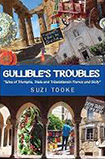Perceptive Travel Book Reviews February 2015
by Susan Griffith
In this issue: Plenty of discomfort to be enjoyed vicariously, from a collection of gripping tales of peril from around the world, to a grueling 3000-mile walk through China, and finally a more banal campervan trip in Europe.
The Irresponsible Traveller: Tales of Scrapes and Narrow Escapes
Various writers, Bradt Publications
What a treat to settle down in a comfy armchair/bathtub/café sofa and dip into these short but riveting tales commissioned by the venerable British guidebook publisher Bradt. Some are downright terrifying, like Catriona Rainsford's run-in with a Mexican drug cartel, or Claire Morsmon's drive through an outback bush fire or Liam Lambert's experience of scuba diving in the Maldives with two of his daughters during the Boxing Day tsunami.
Other emergencies described are less heart-stopping, like the one described by Adrian Phillips (one of the two compilers of the volume) who found himself marooned in rural Ontario with the rental car keys locked in the trunk en route to a specially arranged tree-top walk for a travel article. Or the elegant piece that concludes the volume by Simon Calder about missing the turning when cycling to a radio interview in Cornwall.
Not surprisingly, the volume is a celebration of all things Bradt, and a number of the contributors are from the Bradt stable of writers and friends, including one who used the 1987 edition of Bradt's No Frills Guide to Sudan (and nearly expired of dehydration in the arid Jebel Marra) and another who has written the yet-to-be-published Slow Guide to Dumfries and Galloway in Scotland. The two necessary ingredients are simply having a good story and the skill to tell it well. Most of the contributors are travel authorities who have both; you will find no clichéd crumbling castles, breathtaking sunsets, or lands of contrast here. Some pieces are no more than 700 words but are admirably compressed and well crafted.
The reminiscences of travel catastrophes from decades ago—terror recollected in tranquility—are leavened with stories by young whippersnappers. Scrapes and narrow escapes tend to happen to the young and naive. As Nick Redmayne memorably puts it as he remembers hunkering down lost in southern Sudan: "the bastions of youthful indestructibility lay beside me in ruins, levelled by poor hygiene and thirst".
This volume will be sure to make you ponder your own past acts of travel irresponsibility. I might have written about the time I ignored local advice and went for a riverside walk in the Swat valley where I was soon joined by two youths who ostentatiously produced a huge dagger. I marveled over the beauty of its carving, offered to take a photograph of them brandishing it, and then beat a judicious retreat.
Walking Home from Mongolia: Ten Million Steps Through China from the Gobi Desert to the South China Sea
By Rob Lilwall
This is another travel tale you will be glad to experience second hand. British adventurers Rob Lilwall and Leon McCarron (the latter's book about his TransAmerica cycle journey was reviewed here last year) set themselves the unrealistic target of covering the vast and often unrewarding distance between Mongolia and Rob's home in Hong Kong in four and a half months. Much of their adventure sounds downright miserable: arctic temperatures, unvarying diet of instant noodles and processed sausage, punishing timetable of covering up to 30 miles a day, separation from partners, a metatarsal stress fracture and, worst of all, the tyranny of having to film the expedition to fulfill a contract with a television production company. The lowest point of the journey comes when they learn that a technical fault with their camera has rendered unusable most of the footage taken over the first 537 miles in a Mongolian winter.
So much energy has to be expended on survival that the life and culture of China play second fiddle. Some encounters on the road are telling, of course, such as evidence of Han colonization of Inner Mongolia and the degradations of the natural environment by coal mines in Shangxi province. The author's attempts to improve his basic Mandarin along the way are admirable, even if tonal mistakes mean that he ends up asking for a bowl of sleep rather than dumplings. But he would be the first to admit that he does not speak enough of the language for anything other than superficial encounters.
You have to wonder why people put themselves through such hardship, a question of topical interest in the wake of the successful free climb of Yosemite's El Capitan. Lilwall does not shy away from describing the negative impact of such a masochistic journey. He admits that his envy of Leon's faster walking pace sometimes poisons his thoughts, and he is ashamed of his stinginess when reluctant to give a ten dollar bill to a peasant who has shown hospitality. You sense that he has to work hard to justify to himself that all this suffering is worthwhile. On one occasion when they waste a day and a half following a shortcut that peters out at an impassable cliff, he acknowledges his bone-weary disappointment: "At moments like this, the expedition seemed a far cry from the epic walk I had envisioned." Later at an even lower ebb, he frankly wonders how they can make their expedition seem something other than a "meaningless penance."
More honestly than most, this book faces the discrepancy between dream and reality: for example the romantic idea of experiencing the remote Gobi Desert evaporates as they survey a "barren wasteland of grit, snow and small defiant bushes." These are the very qualities—grit and defiance—that our two small heroes demonstrate as they endure great vicissitudes. And it makes for a thoughtful and interesting read.
Gullible's Troubles: Tales of Triumphs, Trials and Tribulations in France and Sicily
By Suzi Tooke
Take a pair of jaunty retirees from Brisbane, put them in a dodgy campervan, and send them off to explore England, France and Sicily. Is this a recipe for a travel book worth reading? Well, it depends. A basic requirement would be a respect for the facts, something that is missing here and in my view cannot be excused by the author's breezy apology for historical inaccuracies—"it's just what I remember from reading various signs at the multitude of churches, historic places, etc. and from my (old) guidebooks."
By the time we get to a potted history of the Provençal town of Les Arcs on page 164, I had completely lost patience. The author claims that in the town's mediaeval heyday a local noblewoman, Eleanor, married Henry III and that she's the one after whom England's Eleanor Crosses are named.... No she's not. That was Eleanor of Castille, whose devoted husband King Edward I erected a dozen crosses between Lincoln and London to commemorate his wife. And to add insult to injury the author wonders aloud whether the song "Ride a White Horse to Banbury Cross" has anything to do with her. Sigh. Banbury does not have an Eleanor Cross. And besides the song is "Ride a Cock Horse..." You don't have to be a pedant to object to so much cock-eyed information, unforgivable in the age of Google.
I have no reason to doubt the veracity of all the rest—the traffic jams, parking problems, impossibility of finding gas for their camper van fridge (primarily to keep the beer chilled), but that does not mean I want to read it. "Oh these little things that mean so much" the author writes of getting the laundry done and so much else that has no place in a travel narrative.
Here we see demonstrated the dangers of listening to your friends and family who, because they enjoy reading your emails from abroad, urge you to write a book. I'm sure the author is a jolly nice person, and middle-aged Australians considering a camper van trip round Europe might possibly enjoy getting a flavor of the problems and pleasures that await them. But it is not a book that can be commended to the rest of us.
Susan Griffith is a Canadian travel writer and editor based in Cambridge England, who writes books and articles for adventurous working travelers. Starting with the classic Work Your Way Around the World (personally updated by her over its 16 editions) and Teaching English Abroad, she has recently turned her attention to gap years and has written definitive guides for the young and the not-so-young: Your Gap Year and Gap Years for Grown-ups. She also contributes to the travel pages of the Independent, a British daily newspaper.
See the last round of book reviews from Susan Griffith
- A Cowboy at the End of the World by Shelley Seale
- The Sultanate of Heavy Rock in Malaysia by Marco Ferraris
- Enduring Burmese Tea by James Michael Dorsey
- World Music Reviews

Buy The Irresponsible Traveller at your local bookstore, or get it online here:
Amazon US
Amazon Canada
Amazon UK

Buy Walking Home from Mongolia in your local bookstore or online here:
Amazon US
Amazon Canada
Amazon UK
Kobo

Buy Gullible's Troubles at your local bookstore, or get it online here:
Amazon US
Amazon Canada
Amazon UK

